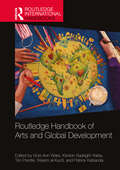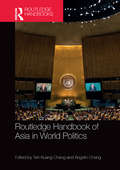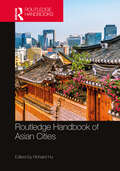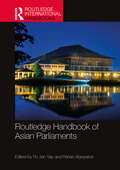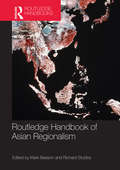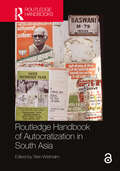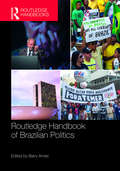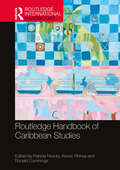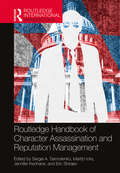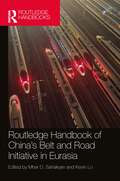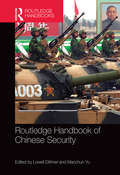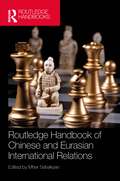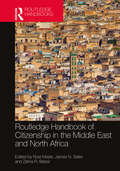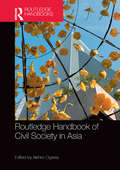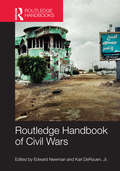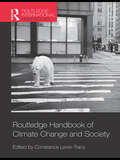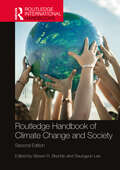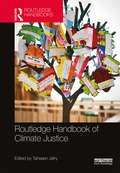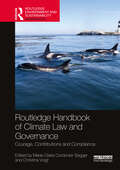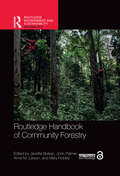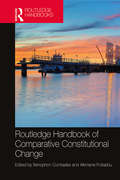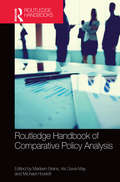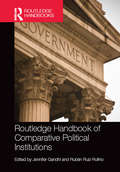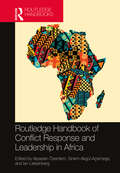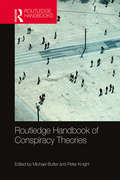- Table View
- List View
Routledge Handbook of Arts and Global Development (Routledge International Handbooks)
by Tim Prentki Patrick Kabanda Kirsten Sadeghi-Yekta Vicki-Ann Ware Wasim Al KurdiThis book brings together a leading team of international experts in arts and global development to showcase effective practice and to explore how this vibrant interdisciplinary field has developed and what the latest research can teach us.Although arts play a central role in human development, and in the health and wellbeing of individuals and communities, few have attempted to comprehensively explore arts practice as global development. This Handbook first provides a theoretical framework for exploring arts and global development, before surveying a comprehensive range of art forms and development practices to explore the potential of the arts to strategically and beneficially contribute to more just and equitable conditions for communities across the globe. Stretching across the arts from theatre, dance, and music to poetry, film, and visual arts, the book covers topics as diverse as health, education, peacebuilding, livelihoods, sustainability, activism, and arts as research method in programming. The Handbook also identifies gaps in the literature, pointing towards the most pressing and promising avenues for further research over the next few years.This book will be an essential resource for any researcher, student, or practitioner wishing to understand the role of the arts in global development and in the global south more generally.
Routledge Handbook of Asia in World Politics
by Teh-Kuang Chang and Angelin ChangAsia is a complex and diverse continent, which has seen the scope and pace of transformation increase rapidly over the past 30 years. In turn, the economic growth and social change seen in the region, combined with new global security profiles and environmental challenges, have contributed to placing Asia at the forefront of international affairs. This Handbook brings together leading scholars of different disciplines, including Politics and International Relations, Security Studies and Law, to provide a comprehensive analysis of both the prospects and problems which have emerged from Asia’s rise. Examining how developments across the continent have influenced global politics and how the region has responded to the international community in the modern era, the sections cover: Major actors in Asian politics, especially China, Japan and India, International relations in Asia and intra-Asian tensions Special issues of world politics in Asia including modern conflicts in and attitudes towards the Middle East The Routledge Handbook of Asia in World Politics will be useful to students and scholars of Global Politics, International Relations and Asian Studies.
Routledge Handbook of Asian Cities
by Richard HuThis handbook provides the most comprehensive examination of Asian cities—developed and developing, large and small—and their urban development. Investigating the urban challenges and opportunities of cities from every nation in Asia, the handbook engages not only the global cities like Shanghai, Tokyo, Singapore, Seoul, and Mumbai but also less studied cities like Dili, Malé, Bandar Seri Begawan, Kabul, and Pyongyang. The handbook discusses Asian cities in alignment to the United Nations’ New Urban Agenda and Sustainable Development Goals in order to contribute to global policy debates. In doing so, it critically reflects on the development trajectories of Asian cities and imagines an urban future, in Asia and the world, in the post-sustainable, post-global, and post-pandemic era. Presenting 43 chapters of original, insightful research, this book will be of interest to scholars, practitioners, students, and general readers in the fields of urban development, urban policy and planning, urban studies, and Asian studies.
Routledge Handbook of Asian Parliaments (Routledge International Handbooks)
by Po Jen Yap Rehan AbeyratneThis handbook showcases the rich varieties of legislatures that exist in Asia and explains how political power is constituted in 17 jurisdictions in East, Southeast and South Asia. Legislatures in Asia come in all stripes. Liberal democracies co-exist cheek by jowl with autocracies; semi-democratic and competitive authoritarian systems abound. While all legislatures exist to make law and confer legitimacy on the political leadership, how representative they are of the people they govern differs dramatically across the continent, such that it is impossible to identify a common Asian prototype. Divided into thematic and country-by-country sections, this handbook is a one-stop reference that surveys the range of political systems operating in Asia. Each jurisdiction chapter examines the structure and composition of its legislature, the powers of the legislature, the legislative process, thereby providing a clear picture of how each legislature operates both in theory and in practice. The book also thematically analyses the following political systems operating in Asia: communist regimes, liberal democracies, dominant party democracies, turbulent democracies, presidential democracies, military regimes and protean authoritarian rule. This handbook is a vital and comprehensive resource for scholars of constitutional law and politics in Asia.
Routledge Handbook of Asian Regionalism
by Mark Beeson Richard StubbsThe Routledge Handbook of Asian Regionalism is a definitive introduction to, and analysis of, the development of regionalism in Asia, including coverage of East Asia, Southeast Asia and South Asia. The contributors engage in a comprehensive exploration of what is arguably the most dynamic and important region in the world. Significantly, this volume addresses the multiple manifestations of regionalism in Asia and is consequently organised thematically under the headings of: conceptualizing the region economic issues political issues strategic issues regional organizations As such, the Handbook presents some of the key elements of the competing interpretations of this important and highly contested topic, giving the reader a chance to evaluate not just where Asian regionalism is going but also how the scholarship on Asian regionalism is analysing these trends and events. This book will be an indispensable resource for students and scholars of Asian politics, international relations and regionalism.
Routledge Handbook of Autocratization in South Asia
by Sten WidmalmThis handbook offers a comprehensive analysis of the processes and actors contributing to autocratization in South Asia. It provides an enhanced understanding of the interconnectedness of the different states in the region, and how that may be related to autocratization. The book analyzes issues of state power, the support for political parties, questions relating to economic actors and sustainable economic development, the role of civil society, questions of equality and political culture, political mobilization, the role of education and the media, as well as topical issues such as the Covid pandemic, environmental issues, migration, and military and international security. Structured in five sections, contributions by international experts describe and explain outcomes at the national level in India, Pakistan, Bangladesh and Sri Lanka. The final section analyzes conditions for democracy and autocratization and how they are affected by the interplay of political forces at the international level in this region. India – building an ethnic state? Pakistan – the decline of civil liberties Bangladesh – towards one-party rule Sri Lanka – the resilience of the ethnic state How to comprehend autocratization in South Asia – three broad perspectives This innovative handbook is the first to describe and to explain ongoing trends of autocratization in South Asia, demonstrating that drivers of political change also work across boundaries. It is an important reference work for students and researchers of South Asian Studies, Asian Studies, Area Studies and Political Science. The Open Access version of this book, available at http://www.taylorfrancis.com, has been made available under a Creative Commons Attribution-Non Commercial-No Derivatives 4.0 license.
Routledge Handbook of Brazilian Politics
by Barry AmesWith contributions from leading international scholars, this Handbook offers the most rigorous and up-to-date analyses of virtually every aspect of Brazilian politics, including inequality, environmental politics, foreign policy, economic policy making, social policy, and human rights. The Handbook is divided into three major sections: Part 1 focuses on mass behavior, while Part 2 moves to representation, and Part 3 treats political economy and policy. The Handbook proffers five chapters on mass politics, focusing on corruption, participation, gender, race, and religion; three chapters on civil society, assessing social movements, grass-roots participation, and lobbying; seven chapters focusing on money and campaigns, federalism, retrospective voting, partisanship, ideology, the political right, and negative partisanship; five chapters on coalitional presidentialism, participatory institutions, judicial politics, and the political character of the bureaucracy, and eight chapters on inequality, the environment, foreign policy, economic and industrial policy, social programs, and human rights. This Handbook is an essential resource for students, researchers, and all those looking to understand contemporary Brazilian politics.
Routledge Handbook of Caribbean Studies (Routledge International Handbooks)
by Kevon Rhiney Ronald Cummings Patricia NoxoloThe Routledge Handbook of Caribbean Studies provides a critical collection of world-class scholarship about this fascinating, diverse and dynamic region.Bringing together new and established voices on the Anglophone, Francophone, Spanish-speaking and Dutch-speaking Caribbean, the handbook explores the cultural and historical shapes and reach of the region, as well as the environmental, climatic and (geo)political challenges that it faces in the 21st century. Each of its four parts – Environment, (Geo)politics, History and Culture – explores the region’s conceptual and material entanglements and disentanglements, its transnational and transregional connections and disconnections, and its historical wakes and posts.The Routledge Handbook of Caribbean Studies is essential reading for all who want to know more about this much-studied but often misrepresented and misunderstood region.
Routledge Handbook of Character Assassination and Reputation Management (Routledge International Handbooks)
by Martijn Icks Eric B. Shiraev Sergei A. Samoilenko Jennifer KeohaneIn modern politics as well as in historical times, character attacks abound. Words and images, like symbolic and psychological weapons, have sullied or destroyed numerous reputations. People mobilize significant material and psychological resources to defend themselves against such attacks. How does character assassination "work," and when does it not? Why do many targets fall so easily when they are under character attack? How can one prevent attacks and defend against them? The Routledge Handbook of Character Assassination and Reputation Management offers the first comprehensive examination of character assassination. Moving beyond studying corporate reputation management and how public figures enact and maintain their reputation, this lively volume offers a framework and cases to help understand, critically analyze, and effectively defend against such attacks. Written by an international and interdisciplinary team of experts, the book begins with a theoretical introduction and extensive description of the "five pillars" of character assassination: (1) the attacker, (2) the target, (3) the media, (4) the public, and (5) the context. The remaining chapters present engaging case studies suitable for class discussion. These include: Roman emperors; Reformation propaganda; the Founding Fathers; defamation in US politics; women politicians; autocratic regimes; European leaders; celebrities; nations; Internet campaigns. This handbook will prove invaluable to undergraduate and postgraduate students in communication, political science, history, sociology, and psychology departments. It will also help researchers become independent, critical, and informed thinkers capable of avoiding the pressure and manipulations of the media.
Routledge Handbook of China's Belt and Road Initiative in Eurasia
by Mher D. Sahakyan Kevin LoThis handbook critically analyses and examines the impact of China’s Belt and Road Initiative (BRI) geostrategy in Eurasia. Over the last decade, the BRI contributed to China becoming an economic and political superpower, but the Russo–Ukrainian War brought seismic geopolitical and geoeconomic impacts and a new struggle between great powers. Covering the impact of the BRI and the positions of other great, middle, and small powers, the ten parts explain the geopolitical and geoeconomic dynamics along the Silk Road Economic Belt’s six major economic corridors, implementing case studies on Europe, South Caucasus, Central Asia, Russian Far East, Middle East, South Asia, Southeast Asia, and East Asia.Expert scholars from East, West, North, and South engage with BRI concepts to create a book that will be of interest to policymakers, businesspeople, scholars, and students of area studies, cybersecurity and digitalisation, economics, security studies, the politics of international trade, foreign policy, global governance, and international organisations.
Routledge Handbook of Chinese Security
by Maochun Yu Lowell DittmerLocated in the center of Asia with one of the largest land frontiers in the world and 14 neighbors whose dispositions could not easily be predicted, China has long been obsessed with security. In this handbook, an internationally renowned team of contributors provide a comprehensive and systematic analysis of contemporary thinking about Chinese national security. Chapters cover the PRC's historical, ideological and doctrinal heritage related to security, its security arrangements and policies targeting key regions and nations of the world, the security aspects of the PRC's ground, air, sea, space and cyber forces, as well as the changing and expanding definition and scope of China's security theory and practice.
Routledge Handbook of Chinese and Eurasian International Relations
by Šárka Waisová Greg Simons Richard J. Cook Máté Szalai Mher Sahakyan Selçuk Çolakoğlu Matthieu Grandpierron Armine Arzumanyan Gohar Barseghyan Giorgio Caridi Yulong Dai Tamas Dudlak Eduard Z. Galimullin Davoud Gharayagh-Zandi Orazio Maria Gnerre Zhaoying Han Mehmood Hussain Ruslan Izimov Ahmed Bux Jamali Connor Judge Magdalena Łągiewska Hongsong Liu Tai-Ting Liu, Tony Kevin Lo Zamira Muratalieva Maximilian Ohle Gina Panagopoulou Anahit Parzyan Eric Pomès Elżbieta Proń Asantha Senevirathna Wong Yue Shun, Brian Lev M. Sokolshchik Nenad Stekić Srdjan Uljevic Yip Wai Cheong, Jason Jan ŽeleznýThe Routledge Handbook of Chinese and Eurasian International Relations explores China’s relations with the Eurasian continent’s regions and countries in a multipolar era, providing an equal and balanced platform for scholars and practitioners from East, West, North, and South. This diversity enriches the contribution, giving it a dynamic ability to examine sources in different languages and cover a vast geography.Divided into ten parts, this handbook analyses the major powers in a Multipolar World Order; China’s political and economic interests in post-Soviet Eurasia, Middle East, Europe, Asia-Pacific, and Arctic; and China's relations with the US, Russia, Eurasian Economic Union, NATO and other players. International technology and environmental experts consider the impact of the Belt and Road Initiative, along with other international economic and transport corridors, and examine China’s multilateral relations and Digital Silk Road and e-governance roles. The Routledge Handbook of Chinese and Eurasian International Relations also contains official documents detailing the establishment of diplomatic relations between China and several European and Asian states, making it an authoritative source on diplomatic affairs.This groundbreaking book will be of interest to policymakers, businessmen, scholars, and students of international relations, area studies, cybersecurity and digitalization, economics and the politics of international trade, security studies, foreign policy, global governance, international organizations, and environmental studies.
Routledge Handbook of Citizenship in the Middle East and North Africa
by James N. Sater Roel Meijer Zahra R. BabarThis comprehensive Handbook gives an overview of the political, social, economic and legal dimensions of citizenship in the Middle East and North Africa from the nineteenth century to the present. The terms citizen and citizenship are mostly used by researchers in an off-hand, self-evident manner. A citizen is assumed to have standard rights and duties that everyone enjoys. However, citizenship is a complex legal, social, economic, cultural, ethical and religious concept and practice. Since the rise of the modern bureaucratic state, in each country of the Middle East and North Africa, citizenship has developed differently. In addition, rights are highly differentiated within one country, ranging from privileged, underprivileged and discriminated citizens to non-citizens. Through its dual nature as instrument of state control, as well as a source of citizen rights and entitlements, citizenship provides crucial insights into state-citizen relations and the services the state provides, as well as the way citizens respond to these actions. This volume focuses on five themes that cover the crucial dimensions of citizenship in the region: Historical trajectory of citizenship since the nineteenth century until independence Creation of citizenship from above by the state Different discourses of rights and forms of contestation developed by social movements and society Mechanisms of inclusion and exclusion Politics of citizenship, nationality and migration Covering the main dimensions of citizenship, this multidisciplinary book is a key resource for students and scholars interested in citizenship, politics, economics, history, migration and refugees in the Middle East and North Africa.
Routledge Handbook of Civil Society in Asia
by Akihiro OgawaThe Routledge Handbook of Civil Society in Asia is an interdisciplinary resource, covering one of the most dynamically expanding sectors in contemporary Asia. Originally a product of Western thinking, civil society represents a particular set of relationships between the state and either society or the individual. Each culture, however, molds its own version of civil society, reflecting its most important values and traditions. This handbook provides a comprehensive survey of the directions and nuances of civil society, featuring contributions by leading specialists on Asian society from the fields of political science, sociology, anthropology, and other disciplines. Comprising thirty-five essays on critical topics and issues, it is divided into two main sections: Part I covers country specific reviews, including Japan, China, South Korea, India, and Singapore. Part II offers a series of thematic chapters, such as democratization, social enterprise, civic activism, and the media. As an analysis of Asian social, cultural, and political phenomena from the perspective of civil society in the post-World War IIera, this book will be useful to students and scholars of Asian Studies, Asian Politics, and Comparative Politics.
Routledge Handbook of Civil Wars
by Edward Newman Karl DeRouenThis comprehensive new Handbook explores the significance and nature of armed intrastate conflict and civil war in the modern world. Civil wars and intrastate conflict represent the principal form of organised violence since the end of World War II, and certainly in the contemporary era. These conflicts have a huge impact and drive major political change within the societies in which they occur, as well as on an international scale. The global importance of recent intrastate and regional conflicts in Afghanistan, Pakistan, Iraq, Somalia, Nepal, Cote d'Ivoire, Syria and Libya – amongst others – has served to refocus academic and policy interest upon civil war. Drawing together contributions from key thinkers in the field who discuss the sources, causes, duration, nature and recurrence of civil wars, as well as their political meaning and international impact, the Handbook is organised into five key parts: Part I: Understanding and Explaining Civil Wars: Theoretical and Methodological Debates Part II: The Causes of Civil Wars Part III: The Nature and Impact of Civil Wars Part IV: International Dimensions Part V: Termination and Resolution of Civil Wars Covering a wide range of topics including micro-level issues as well as broader debates, Routledge Handbook of Civil Wars will set a benchmark for future research in the field. This volume will be of much interest to students of civil wars and intrastate conflict, ethnic conflict, political violence, peace and conflict studies, security studies and IR in general.
Routledge Handbook of Climate Change and Society (Routledge International Handbooks)
by Constance Lever-TracyAs the time-scales of natural change accelerate and converge with those of society, Routledge Handbook of Climate Change and Society takes the reader into largely uncharted territory in its exploration of anthropogenic climate change. Current material is used to highlight the global impact of this issue, and the necessity for multidisciplinary and global social science research and teaching to address the problem. The book is multidisciplinary and worldwide in scope, with contributors spanning specialisms including agro-forestry, economics, environmentalism, ethics, human geography, international relations, law, politics, psychology, sociology and theology. Their global knowledge is reflected in the content of the text, which encompasses chapters on American, European and Chinese policies, case studies of responses to disasters and of the new technological and lifestyle alternatives that are being adopted, and the negotiations leading up to the Copenhagen conference alongside a preface assessing its outcomes. Starting with an initial analysis by a leading climatologist, key issues discussed in the text include recent findings of natural scientists, social causation and vulnerability, media and public recognition or scepticism, and the merits and difficulties of actions seeking to mitigate and adapt. This accessible volume utilizes a wealth of case studies, explains technical terms and minimises the use of acronyms associated with the subject, making it an essential text for advanced undergraduates, postgraduate students and researchers in the social sciences.
Routledge Handbook of Climate Change and Society (Routledge International Handbooks)
by Steven R. Brechin Seungyun LeeRoutledge Handbook of Climate Change and Society is a comprehensive guide that provides insights into the multifaceted relationship between climate change and society and covers a wide array of topics, disciplines, and cultures, from the latest trends in weather patterns to the issue of climate (in)justice. The second edition, which is overwhelmingly comprised of all-new essays, is an indispensable resource for those interested in understanding the complexities of climate change and its societal implications.The book contains seven thematically organized sections examining the various aspects of climate change and its intersection with our society: Climate Change in the Natural and Social Sciences; Human Population, Movement, and Health; Economics, Energy, and Consumption; Urban Climate Resiliency; Technological Innovations and Pitfalls; Gender, Poverty, and Justice; and Politics and Governance. Each part provides a unique and important perspective for understanding the challenges as well as opportunities presented by climate change.Through original research findings and critical analysis, this book sheds light on the urgent need for interdisciplinary approaches to tackle climate change effectively. By examining the intersectionality of climate change with various social, economic, and political factors, it offers valuable insights for researchers, policymakers, activists, and anyone concerned about the future of our planet. With a forward-looking perspective that emphasizes optimism and resilience, this book serves as a tool for fostering hope and collective action in the face of climate change challenges.
Routledge Handbook of Climate Justice (Routledge Environment and Sustainability Handbooks)
by Tahseen Jafry Michael Mikulewicz Karin HelwigThe term "climate justice" began to gain traction in the late 1990s following a wide range of activities by social and environmental justice movements that emerged in response to the operations of the fossil fuel industry and, later, to what their members saw as the failed global climate governance model that became so transparent at COP15 in Copenhagen. The term continues to gain momentum in discussions around sustainable development, climate change, mitigation and adaptation, and has been slowly making its way into the world of international and national policy. However, the connections between these remain unestablished. Addressing the need for a comprehensive and integrated reference compendium, The Routledge Handbook of Climate Justice provides students, academics and professionals with a valuable insight into this fast-growing field. Drawing together a multidisciplinary range of authors from the Global North and South, this Handbook addresses some of the most salient topics in current climate justice research, including just transition, urban climate justice and public engagement, in addition to the field’s more traditional focus on gender, international governance and climate ethics. With an emphasis on facilitating learning based on cutting-edge specialised climate justice research and application, each chapter draws from the most recent sources, real-world best practices and tutored reflections on the strategic dimensions of climate justice and its related disciplines. The Routledge Handbook of Climate Justice will be essential reading for students and scholars, as well as being a vital reference tool for those practically engaged in the field.
Routledge Handbook of Climate Law and Governance: Courage, Contributions and Compliance
by Marie-Claire Cordonier Segger Christina VoigtCourage, Contributions and Compliance: The Routledge Handbook of Climate Law and Governance recognises calls from the United Nations (UN), the Intergovernmental Panel on Climate Change (IPCC). The elders, and others, for climate justice and urgent action, and convenes insights from leading legal and institutional experts, professors, professionals and early career scholars on emerging climate law and policy challenges, commitments and solutions.The collection explores the role of law and governance in scaling up global responses to climate change and advancing sustainability. Based on careful study of international advances and the full spectrum of Nationally Determined Contributions (NDCs) to the global response to climate change, as submitted by Paris Agreement Parties to the UN Framework Convention on Climate Change (UNFCCC), the volume compiles a compelling, coherent and systematic topical account from across diverse legal jurisdictions. Analytical chapters by leading experts, practitioners and scholars close to ongoing climate negotiations explore recent legal and institutional innovations related to climate change which can support implementation and compliance with the Paris Agreement and advance the global Sustainable Development Goals (SDGs). They highlight ways to raise ambition through law and policy, to reform national legal and institutional arrangements to implement NDCs and to further develop international law and governance in the face of the existential threat of climate change and the world: sustainable development commitments.Presenting a pathway for advancing climate ambition in the coming decades, this book will be of interest to government officials, academics, students, professionals and policy makers working in the area of climate law and governance.
Routledge Handbook of Community Forestry (Routledge Environment and Sustainability Handbooks)
by Janette Bulkan, John Palmer, Anne M. Larson, and Mary HobleyThis handbook provides a comprehensive overview and cutting-edge assessment of community forestry. Containing contributions from academics, practitioners, and professionals, the Routledge Handbook of Community Forestry presents a truly global overview with case studies drawn from across Africa, Asia, Europe, and the Americas. The Handbook begins with an overview of the chapters and a discussion of the concept of community forestry and the key issues. Topics as wide-ranging as Indigenous forestry, conservation and ecosystem management, relationships with industrial forestry, trade and supply systems, land tenure and land grabbing, and climate change are addressed. The Handbook also focuses on governance, looking at the range of approaches employed, including multi-level governance and rights-based approaches, and the principal actors involved from local communities and Indigenous Peoples to governments and national and international non-governmental organisations. The Handbook reveals the importance of the historical context to community forestry and the effects of power and politics. Importantly, the Handbook not only focuses on successful examples of community forestry, but also addresses failures in order to highlight the key challenges we are still facing and potential solutions. The Routledge Handbook of Community Forestry is essential reading for academics, professionals, and practitioners interested in forestry, natural resource management, conservation, and sustainable development.
Routledge Handbook of Comparative Constitutional Change
by Xenophon ContiadesComparative constitutional change has recently emerged as a distinct field in the study of constitutional law. It is the study of the way constitutions change through formal and informal mechanisms, including amendment, replacement, total and partial revision, adaptation, interpretation, disuse and revolution. The shift of focus from constitution-making to constitutional change makes sense, since amendment power is the means used to refurbish constitutions in established democracies, enhance their adaptation capacity and boost their efficacy. Adversely, constitutional change is also the basic apparatus used to orchestrate constitutional backslide as the erosion of liberal democracies and democratic regression is increasingly affected through legal channels of constitutional change. Routledge Handbook of Comparative Constitutional Change provides a comprehensive reference tool for all those working in the field and a thorough landscape of all theoretical and practical aspects of the topic. Coherence from this aspect does not suggest a common view, as the chapters address different topics, but reinforces the establishment of comparative constitutional change as a distinct field. The book brings together the most respected scholars working in the field, and presents a genuine contribution to comparative constitutional studies, comparative public law, political science and constitutional history.
Routledge Handbook of Comparative Policy Analysis
by Michael Howlett Iris Geva-May Marleen BransThis Handbook presents the first comprehensive study of policy analytical practices in comparative perspective. It explores emerging developments and innovations in the field and advances knowledge of the nature and quality of policy analysis across different countries and at different levels of government by all relevant actors, both inside and outside government, who contribute to the diagnosis of problems and the search for policy solutions. Handbook chapters examine all aspects of the science, art and craft of policy analysis. They do so both at the often-studied national level, and also at the less well-known level of sub-national and local governments. In addition to studying governments, the Handbook also examines for the first time the practices and policy work of a range of non-governmental actors, including think tanks, interest groups, business actors, labour groups, media, political parties and non-profits. Bringing together a rich collection of cases and a renowned group of scholars, the Handbook constitutes a landmark study in the field.
Routledge Handbook of Comparative Political Institutions
by Jennifer Gandhi Rubén Ruiz-RufinoThe Routledge Handbook of Comparative Political Institutions (HCPI) is designed to serve as a comprehensive reference guide to our accumulated knowledge and the cutting edge of scholarship about political institutions in the comparative context. It differs from existing handbooks in that it focuses squarely on institutions but also discusses how they intersect with the study of mass behaviour and explain important outcomes, drawing on the perspective of comparative politics. The Handbook is organized into three sections: The first section, consisting of six chapters, is organized around broad theoretical and empirical challenges affecting the study of institutions. It highlights the major issues that emerge among scholars defining, measuring, and analyzing institutions. The second section includes fifteen chapters, each of which handles a different substantive institution of importance in comparative politics. This section covers traditional topics, such as electoral rules and federalism, as well as less conventional but equally important areas, including authoritarian institutions, labor market institutions, and the military. Each chapter not only provides a summary of our current state of knowledge on the topic, but also advances claims that emphasise the research frontier on the topic and that should encourage greater investigation. The final section, encompassing seven chapters, examines the relationship between institutions and a variety of important outcomes, such as political violence, economic performance, and voting behavior. The idea is to consider what features of the political, sociological, and economic world we understand better because of the scholarly attention to institutions. Featuring contributions from leading researchers in the field from the US, UK, Europe and elsewhere, this Handbook will be of great interest to all students and scholars of political institutions, political behaviour and comparative politics. Jennifer Gandhi is Associate Professor, Department of Political Science, Emory University. Rubén Ruiz-Rufino is Lecturer in International Politics, Department of Political Economy, King’s College London.
Routledge Handbook of Conflict Response and Leadership in Africa
by Alpaslan Özerdem Ian Liebenberg Sinem Akgül-AçıkmeşeThis handbook explores the challenges and opportunities for leadership and conflict response in the context of Africa at several levels. Leadership plays a vital role in affecting conflict response but is frequently only examined at the macro level of state, government, and international organizations. This handbook addresses the need to explore challenges and opportunities for leadership at several levels: macro (global, regional, national), meso (NGOs, religious groups, academics), and micro (civil society organizations, youth groups, women’s organizations). Analysis from multiple levels provides a broader explanation of conflict dynamics and helps to fit localized conflict transformation approaches into wider national or regional structures. The multidisciplinary essays presented in this volume encompass the psychological, political, and structural dimensions of conflict response and demonstrate how its success is fundamentally linked to the style of effectiveness of leadership, among other factors. The volume is divided into four thematic sections: Part I: The theory and dynamics of conflict response and leadership Part II: Macro-level leadership experiences in conflict response Part III: Meso-/micro-level leadership experiences in conflict response Part IV: Recommendations for improved leadership in conflict response This book will be of much interest to students of conflict resolution, peace studies, African politics, security studies, and international relations, in general.
Routledge Handbook of Conspiracy Theories (Conspiracy Theories)
by Peter Knight Michael ButterTaking a global and interdisciplinary approach, the Routledge Handbook of Conspiracy Theories provides a comprehensive overview of conspiracy theories as an important social, cultural and political phenomenon in contemporary life. This handbook provides the most complete analysis of the phenomenon to date. It analyses conspiracy theories from a variety of perspectives, using both qualitative and quantitative methods. It maps out the key debates, and includes chapters on the historical origins of conspiracy theories, as well as their political significance in a broad range of countries and regions. Other chapters consider the psychology and the sociology of conspiracy beliefs, in addition to their changing cultural forms, functions and modes of transmission. This handbook examines where conspiracy theories come from, who believes in them and what their consequences are. This book presents an important resource for students and scholars from a range of disciplines interested in the societal and political impact of conspiracy theories, including Area Studies, Anthropology, History, Media and Cultural Studies, Political Science, Psychology and Sociology.
